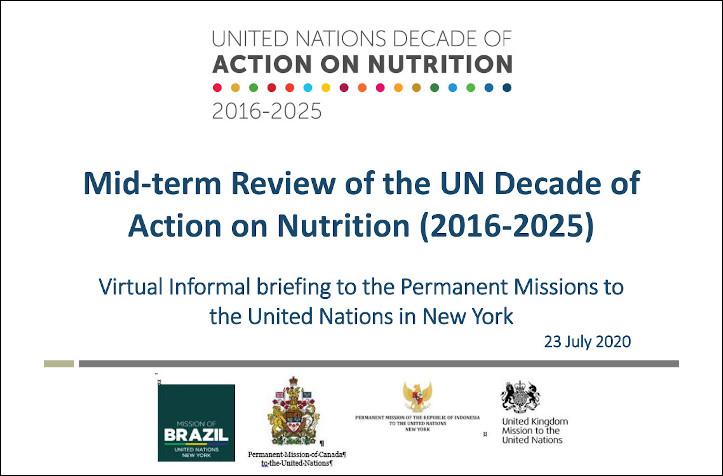UN Decade of Action on Nutrition: halfway through!
23 July 2020 | NEW YORK – Almost five years have passed since the UN Decade of Action on Nutrition was launched in April 2016; five years full of energy and efforts to foster partnerships and dialogue for nutrition.
Achievements
On 23 July 2020, an informal virtual briefing on the mid-term review process of the Nutrition Decade was organized and attended by 134 delegates from UN Member States, UN agencies, the UN Foundation, the European Commission and various civil society organizations.
The joint FAO/WHO Secretariat of the Nutrition Decade – represented by Anna Lartey, Director of FAO’s Food and Nutrition Division and Francesco Branca, Director of WHO’s Department of Nutrition and Food Safety – summarized the key points of the mid-term review, starting with achievements under the six action areas of the Nutrition Decade's Work Programme and proposed priority areas for the next five years, focusing on multisectorial approaches to combat all forms of malnutrition. “The world is still not on track to defeat malnutrition,” stated Branca. ”While there is progress on child stunting and exclusive breastfeeding, childhood overweight is not improving, and adult obesity is on the rise.”
Following the presentation on the mid-term review, the delegates had a discussion about the lessons learned from the first five years of the Nutrition Decade and the priority actions for the second half, in order to advance the global nutrition agenda and contribute to the Decade of Action to deliver the Sustainable Development Goals (SDGs).
It was noted that despite the growing awareness and commitment of nutrition stakeholders, the final objectives are still far from being reached. Hunger has been on the rise for the past 4 years and malnutrition in all its forms is affecting millions of people worldwide largely due to growing patterns of economic and social inequality. “The elimination of agricultural barriers worldwide is a moral imperative, especially at a time when food insecurity and malnutrition are on the rise. This is what makes the difference between building back and building back better”, said Ronaldo Costa Filho, Permanent Representative of Brazil to the UN in New York.
The COVID-19 pandemic
The COVID-19 crisis and its consequences on food systems were widely discussed throughout the briefing as well as several means to address them.
As highlighted by Leslie Norton, Permanent Representative of Canada to the UN in Geneva: “As a global community, we must come together and redouble our efforts to address malnutrition. This includes identifying how and where to mitigate, address, and ultimately reverse the additional risk created by the COVID-19 pandemic.” James Roscoe, Acting Deputy Permanent Representative of the United Kingdom to the UN, agreed with Norton: “COVID-19 has exacerbated the underlying drivers of malnutrition, which is why this mid-term review is crucial to refocusing our efforts as we enter the second half of the Nutrition Decade.“
Way forward
What clearly emerged from the interactive dialogue is that the challenges to be faced are increasingly global in scope and therefore, in order to address them properly, it is necessary to intensify cooperation at all levels. M. Mohammad K. Koba, Deputy Permanent Representative of the Republic of Indonesia, emphasized in his closing remarks that: “We have a chance to refocus actions in the second half of the Nutrition Decade but we need to strengthen our solidarity to achieve food security and good nutrition for all.”
Delegates concluded that it will be imperative that the Work Programme for the period 2021-2025 addresses emerging challenges, so that access to affordable healthy diets all-year round becomes a reality for everyone by 2025. The second half of the Nutrition Decade should be a time for action and implementation with the establishment of action networks and the reinforcement of country-specific commitments for action on nutrition. The forthcoming Tokyo Nutrition for Growth Summit 2021 and the UN Food Systems Summit 2021 offer central opportunities to set new SMART – specific, measurable, achievable, relevant, and time-bound – commitments for action on nutrition and maximize co-benefits across SDGs.



